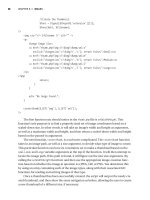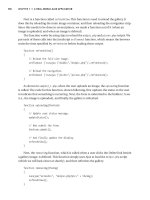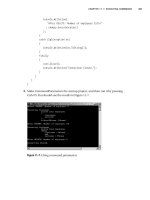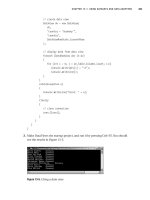Beginning Java SE 6 Platform From Novice to Professional phần 7 pdf
Bạn đang xem bản rút gọn của tài liệu. Xem và tải ngay bản đầy đủ của tài liệu tại đây (409.43 KB, 51 trang )
ScriptEngineManager A class that is the entry point into the Scripting API. It discovers and
instantiates script engine factories, providing a method that lets an
application enumerate these factories and retrieve a script engine that
exposes the appropriate metadata (such as the correct language name
and version number) from a factory. It also provides various methods
for obtaining script engines by extension, MIME type, or short name.
This class maintains a global scope; this scope’s key/value pairs are
available to all script engines created by the script engine manager.
ScriptException A class that describes syntax errors and other problems that occur
during script execution. Class members store the line number and
column position where a problem occurred, and also the name of the
file containing the script that was executing. The availability of this
information depends on the context in which the problem occurred.
For example, a ScriptException thrown from executing a script that is
not based on a file is unlikely to record a filename.
SimpleBindings A class that provides a simple implementation of Bindings, which is
backed by some kind of java.util.Map implementation.
SimpleScriptContext A class that provides a simple implementation of ScriptContext.
In addition to javax.script and its classes and interfaces, Java SE 6 includes a script
engine that understands JavaScript. This script engine is based on the Mozilla Rhino
JavaScript implementation. Check out Mozilla’s Rhino: JavaScript for Java page
(
to learn about Rhino.
■Note Mozilla Rhino version 1.6R2 is included with Java SE 6 build 105. This implementation includes
most of Mozilla Rhino, except for JavaScript-to-bytecode compilation, Rhino’s JavaAdapter for extending
Java classes and implementing Java interfaces with JavaScript (Sun’s JavaAdapter is used instead),
ECMAScript for XML, and Rhino command-line tools. An experimental command-line tool, named
jrunscript, is available. I discuss this tool in the “Playing with the Command-Line Script Shell” section
later in this chapter, and also in Appendix B.
CHAPTER 9 ■ SCRIPTING 283
Class/Interface Description
830-X CH09.qxd 9/20/07 2:08 PM Page 283
SCRIPTING API RESOURCES
I recommend several resources for learning more about the Scripting API after you’ve read this chapter:
• The JDK’s script notepad Swing application, which is mostly implemented in JavaScript
• Sun developer Sundar Athijegannathan’s useful and interesting Scripting API blog entries, such as
“JavaScript debugging tips (for Mustang context)” (
/>entry/javascript_debugging_tips_for_mustang)
• John O’Conner’s “Scripting for the Java Platform” article (
/>technicalArticles/J2SE/Desktop/scripting/)
If you’re interested in taking advantage of the Scripting API for web-based scripting, check out the
following:
• Daniel López’s “A Dynamic MVC Development Approach Using Java 6 Scripting, Groovy, and
WebLEAF” article (
/>mvc-webappps-with-groovy-scripting-and-webleaf.html)
• java.net’s Project Phobos home page (
which describes
Phobos as “a lightweight, scripting-friendly, web application environment running on the Java
platform”
Obtaining Script Engines from Factories via the Script Engine
Manager
Prior to performing other scripting tasks, a Java program must obtain an appropriate
script engine. A script engine exists as an instance of a class that implements the
ScriptEngine interface or extends the AbstractScriptEngine class. The program begins
this task by creating an instance of the
ScriptEngineManager class via one of these
constructors:
• The
public ScriptEngineManager() constructor works with the calling thread’s
context classloader if one is available, or the bootstrap classloader otherwise,
and a discovery mechanism to locate
ScriptEngineFactory providers.
• The
public ScriptEngineManager(ClassLoader loader) constructor works with the
specified classloader and the discovery mechanism to locate
ScriptEngineFactory
providers. Passing null to loader is equivalent to calling the former constructor.
CHAPTER 9 ■ SCRIPTING284
830-X CH09.qxd 9/20/07 2:08 PM Page 284
The program uses the ScriptEngineManager instance to obtain a list of factories via
this class’s
public List<ScriptEngineFactory> getEngineFactories() method. For each
factory,
ScriptEngineFactory methods, such as String getEngineName(), return metadata
describing the factory’s script engine. Listing 9-1 presents an application that demon-
strates most of the metadata methods.
Listing 9-1. EnumerateScriptEngines.java
// EnumerateScriptEngines.java
import java.util.*;
import javax.script.*;
public class EnumerateScriptEngines
{
public static void main (String [] args)
{
ScriptEngineManager manager = new ScriptEngineManager ();
List<ScriptEngineFactory> factories = manager.getEngineFactories ();
for (ScriptEngineFactory factory: factories)
{
System.out.println ("Engine name (full): "+
factory.getEngineName ());
System.out.println ("Engine version: "+
factory.getEngineVersion ());
System.out.println ("Supported extensions:");
List<String> extensions = factory.getExtensions ();
for (String extension: extensions)
System.out.println (" "+extension);
System.out.println ("Language name: "+
factory.getLanguageName ());
System.out.println ("Language version: "+
factory.getLanguageVersion ());
System.out.println ("Supported MIME types:");
List<String> mimetypes = factory.getMimeTypes ();
for (String mimetype: mimetypes)
System.out.println (" "+mimetype);
System.out.println ("Supported short names:");
List<String> shortnames = factory.getNames ();
for (String shortname: shortnames)
CHAPTER 9 ■ SCRIPTING 285
830-X CH09.qxd 9/20/07 2:08 PM Page 285
System.out.println (" "+shortname);
System.out.println ();
}
}
}
Assuming that no additional script engines have been installed, you should observe
the following output when you run this application against Java SE 6 build 105:
Engine name (full): Mozilla Rhino
Engine version: 1.6 release 2
Supported extensions:
js
Language name: ECMAScript
Language version: 1.6
Supported MIME types:
application/javascript
application/ecmascript
text/javascript
text/ecmascript
Supported short names:
js
rhino
JavaScript
javascript
ECMAScript
ecmascript
The output reveals that an engine can have both a full name (
Mozilla Rhino) and
multiple short names (
rhino, for example). The short name is more useful than the full
name, as you will see. It also shows that an engine can be associated with multiple
extensions and multiple MIME types, and that the engine is associated with a scripting
language.
ScriptEngineFactory’s getEngineName() and a few other metadata methods defer to
ScriptEngineFactory’s Object getParameter(String key) method, which returns the script-
engine-specific value associated with the argument passed to
key, or null if the argument
is not recognized.
Methods such as
getEngineName() invoke getParameter() with key set to an appropri-
ate
ScriptEngine constant, such as ScriptEngine.ENGINE. As Listing 9-2 demonstrates, you
can also pass
"THREADING" as key, to identify a script engine’s threading behavior, which
you need to know if you plan to evaluate multiple scripts concurrently.
getParameter()
CHAPTER 9 ■ SCRIPTING286
830-X CH09.qxd 9/20/07 2:08 PM Page 286
returns null if the engine is not thread-safe, or one of "MULTITHREADED", "THREAD-ISOLATED",
or
"STATELESS", identifying specific threading behavior.
Listing 9-2. ThreadingBehavior.java
// ThreadingBehavior.java
import java.util.*;
import javax.script.*;
public class ThreadingBehavior
{
public static void main (String [] args)
{
ScriptEngineManager manager = new ScriptEngineManager ();
List<ScriptEngineFactory> factories = manager.getEngineFactories ();
for (ScriptEngineFactory factory: factories)
System.out.println ("Threading behavior: "+
factory.getParameter ("THREADING"));
}
}
Assuming that Mozilla Rhino 1.6 release 2 is the only installed script engine,
ThreadingBehavior outputs Threading behavior: MULTITHREADED. Scripts can execute con-
currently on different threads, although the effects of executing a script on one thread
might be visible to threads executing on other threads. Check out the
getParameter()
section of ScriptEngineFactory’s SDK documentation to learn more about threading
behaviors.
After determining the appropriate script engine, the program can invoke
ScriptEngineFactory’s ScriptEngine getScriptEngine() method to return an instance of
the script engine associated with the factory. Although new script engines are usually
returned, a factory implementation is free to pool, reuse, or share implementations.
The following code fragment shows how to accomplish this task:
if (factory.getLanguageName ().equals ("ECMAScript"))
{
engine = factory.getScriptEngine ();
break;
}
CHAPTER 9 ■ SCRIPTING 287
830-X CH09.qxd 9/20/07 2:08 PM Page 287
Think of the code fragment as being part of Listing 9-1 or 9-2’s for
(ScriptEngineFactory factory: factories) loop; assume that the ScriptEngine variable
engine already exists. If the scripting language hosted by the factory is ECMAScript
(language version does not matter in this example), a script engine is obtained from the
factory and the loop is terminated.
Because the previous approach to obtaining a script engine is cumbersome,
ScriptEngineManager provides three convenience methods that take on this burden,
listed in Table 9-2. These methods let you obtain a script engine based on file extension
(possibly obtained via a dialog-selected script file), MIME type (possibly returned from
a server), and short name (possibly chosen from a menu).
Table 9-2. ScriptEngineManager Convenience Methods for Obtaining a Script Engine
Method Description
public ScriptEngine getEngineByExtension(String extension) Creates and returns a script
engine that corresponds to the
given extension. If a script
engine is not available, this
method returns null. A
NullPointerException is thrown
if null is passed as extension.
public ScriptEngine getEngineByMimeType(String mimeType) Creates and returns a script
engine that corresponds to the
given MIME type. If a script
engine is not available, this
method returns null. A
NullPointerException is thrown
if null is passed as mimeType.
public ScriptEngine getEngineByName(String shortName) Creates and returns a script
engine that corresponds to the
given short name. If a script
engine is not available, this
method returns null. A
NullPointerException is thrown
if null is passed as shortName.
Listing 9-3 presents an application that invokes getEngineByExtension(),
getEngineByMimeType(), and getEngineByName() to obtain a Rhino script engine instance.
Behind the scenes, these methods take care of enumerating factories and invoking
ScriptEngineFactory’s getScriptEngine() method to create the script engine.
CHAPTER 9 ■ SCRIPTING288
830-X CH09.qxd 9/20/07 2:08 PM Page 288
Listing 9-3. ObtainScriptEngine.java
// ObtainScriptEngine.java
import javax.script.*;
public class ObtainScriptEngine
{
public static void main (String [] args)
{
ScriptEngineManager manager = new ScriptEngineManager ();
ScriptEngine engine1 = manager.getEngineByExtension ("js");
System.out.println (engine1);
ScriptEngine engine2 =
manager.getEngineByMimeType ("application/javascript");
System.out.println (engine2);
ScriptEngine engine3 = manager.getEngineByName ("rhino");
System.out.println (engine3);
}
}
After compiling ObtainScriptEngine.java, running the application generates output
that is similar to the following, indicating that different script engine instances are
returned:
com.sun.script.javascript.RhinoScriptEngine@1f14ceb
com.sun.script.javascript.RhinoScriptEngine@f0eed6
com.sun.script.javascript.RhinoScriptEngine@691f36
Once a script engine has been obtained (via
ScriptEngineFactory’s getScriptEngine()
method or one of ScriptEngineManager’s three convenience methods), a program can access
the engine’s factory via
ScriptEngine’s convenient ScriptEngineFactory getFactory() method.
The program can also invoke various
ScriptEngine methods to evaluate scripts.
CHAPTER 9 ■ SCRIPTING 289
830-X CH09.qxd 9/20/07 2:08 PM Page 289
■Note ScriptEngineManager provides public void registerEngineExtension(String
extension, ScriptEngineFactory factory)
, public void registerEngineMimeType(String
type, ScriptEngineFactory factory)
, and public void registerEngineName(String name,
ScriptEngineFactory factory)
methods that let Java programs dynamically register script engine
factories with the script engine manager. Because these methods circumvent the discovery mechanism,
you can replace an existing script engine factory and script engine with your own implementation, which is
returned in subsequent calls to the “getEngine” methods.
Evaluating Scripts
After obtaining a script engine, a Java program can work with ScriptEngine’s six over-
loaded
eval() methods to evaluate scripts. Each method throws a ScriptException if there
is a problem with the script. Assuming successful script evaluation, an
eval() method
returns the script’s result as some kind of
Object, or null if the script does not return a
value.
The simplest of the
eval() methods are Object eval(String script) and Object
eval(Reader reader). The former method is invoked to evaluate a script expressed as a
String; the latter method is invoked to read a script from some other source (such as a file)
and evaluate the script. Each method throws a
NullPointerException if its argument is null.
Listing 9-4 demonstrates these methods.
Listing 9-4. FuncEvaluator.java
// FuncEvaluator.java
import java.io.*;
import javax.script.*;
public class FuncEvaluator
{
public static void main (String [] args)
{
if (args.length != 2)
{
System.err.println ("usage: java FuncEvaluator scriptfile "+
"script-exp");
return;
}
CHAPTER 9 ■ SCRIPTING290
830-X CH09.qxd 9/20/07 2:08 PM Page 290
ScriptEngineManager manager = new ScriptEngineManager ();
ScriptEngine engine = manager.getEngineByName ("rhino");
try
{
System.out.println (engine.eval (new FileReader (args [0])));
System.out.println (engine.eval (args [1]));
}
catch (ScriptException se)
{
System.err.println (se.getMessage ());
}
catch (IOException ioe)
{
System.err.println (ioe.getMessage ());
}
}
}
FuncEvaluator
is designed to evaluate the functions in a Rhino-based script file via
eval(Reader reader). It also uses eval(String script) to evaluate an expression that
invokes one of the functions. Both the script file and script expression are passed to
FuncEvaluator as command-line arguments. Listing 9-5 presents a sample script file.
Listing 9-5. stats.js
function combinations (n, r)
{
return fact (n)/(fact (r)*fact (n-r))
}
function fact (n)
{
if (n == 0)
return 1;
else
return n*fact (n-1);
}
The stats.js file presents combinations(n, r) and fact(n) functions as part of a sta-
tistics package. The
combinations(n, r) function works with the factorial function to
CHAPTER 9 ■ SCRIPTING 291
830-X CH09.qxd 9/20/07 2:08 PM Page 291
calculate and return the number of different combinations of n items taken r items at a
time. For example, how many different poker hands in five-card draw poker (where five
cards are dealt to each player) can be dealt from a full card deck?
Invoke
java FuncEvaluator stats.js combinations(52,5) to discover the answer.
After outputting
null on the first line (to indicate that stats.js does not return a value),
FuncEvaluator outputs 2598960.0 on the line below. The Double value returned from
combinations(52,5) indicates that there are 2,598,960 possible poker hands.
■Note Wikipedia’s Combination entry ( introduces the
statistical concept of combinations. Also, Wikipedia’s Five-card draw entry (
/>wiki/Five-card_draw) introduces the five-card draw poker variation.
Interacting with Java Classes and Interfaces from Scripts
The Scripting API is associated with Java language bindings, which are mechanisms that
let scripts access Java classes and interfaces, create objects, and invoke methods accord-
ing to the syntax of the scripting language. To access a Java class or interface, this type
must be prefixed with its fully qualified package name. For example, in a Rhino-based
script, you would specify
java.lang.Math.PI to access the PI member in Java’s Math class.
In contrast, specifying
Math.PI accesses the PI member in JavaScript’s Math object.
To avoid needing to specify package names throughout a Rhino-based script, the
script can employ the
importPackage() and importClass() built-in functions to import
an entire package of Java types or only a single type, respectively. For example,
importPackage(java.awt); imports all of package java.awt’s types, and
importClass(java.awt.Frame); imports only the Frame type from this package.
■Note According to the
Java Scripting Programmer’s Guide
( />technotes/guides/scripting/programmer_guide/index.html
), java.lang is not imported by
default, to prevent conflicts with same-named JavaScript types—Object, Math, Boolean, and so on.
The problem with
importPackage() and importClass() is that they pollute JavaScript’s
global variable scope. Rhino overcomes this problem by providing a
JavaImporter class
that works with JavaScript’s
with statement to let you specify classes and interfaces with-
out their package names from within this statement’s scope. Listing 9-6’s
swinggui.js
script demonstrates JavaImporter.
CHAPTER 9 ■ SCRIPTING292
830-X CH09.qxd 9/20/07 2:08 PM Page 292
Listing 9-6. swinggui.js
// swinggui.js
function creategui ()
{
var swinggui = new JavaImporter (java.awt, javax.swing);
with (swinggui)
{
println ("Event-dispatching thread: "+EventQueue.isDispatchThread ());
var r = new java.lang.Runnable ()
{
run: function ()
{
println ("Event-dispatching thread: "+
EventQueue.isDispatchThread ());
var frame = new JFrame ("Swing GUI");
frame.setDefaultCloseOperation (JFrame.EXIT_ON_CLOSE);
var label = new JLabel ("Hello from JavaScript",
JLabel.CENTER);
label.setPreferredSize (new Dimension (300, 200));
frame. add (label);
frame.pack ();
frame.setVisible (true);
}
};
EventQueue.invokeLater (r);
}
}
This script (which can be evaluated via java FuncEvaluator swinggui.js creategui())
creates a Swing GUI (consisting of a label) on the event-dispatching thread. The
JavaImporter class imports types from the java.awt and javax.swing packages, which
are accessible from the
with statement’s scope. Because JavaImporter does not import
java.lang’s types, java.lang must be prepended to Runnable.
CHAPTER 9 ■ SCRIPTING 293
830-X CH09.qxd 9/20/07 2:08 PM Page 293
■Note Listing 9-6 also demonstrates implementing Java’s Runnable interface in JavaScript via a syntax
similar to Java’s anonymous inner class syntax.You can learn more about this and other Java-interaction
features (such as creating and using Java arrays from JavaScript) from the
Java Scripting Programmer’s
Guide
.
Communicating with Scripts via Script Variables
Previously, you learned that eval() can return a script’s result as an object. Additionally,
the Scripting API lets Java programs pass objects to scripts via script variables, and obtain
script variable values as objects.
ScriptEngine provides void put(String key, Object
value) and Object get(String key) methods for these tasks. Both methods throw
NullPointerException if key is null, IllegalArgumentException if key is the empty string,
and (according to the
SimpleBindings.java source code) ClassCastException if key is not
a
String. Listing 9-7’s application demonstrates put() and get().
Listing 9-7. MonthlyPayment.java
// MonthlyPayment.java
import javax.script.*;
public class MonthlyPayment
{
public static void main (String [] args)
{
ScriptEngineManager manager = new ScriptEngineManager ();
ScriptEngine engine = manager.getEngineByExtension ("js");
// Script variables intrate, principal, and months must be defined (via
// the put() method) prior to evaluating this script.
String calcMonthlyPaymentScript =
"intrate = intrate/1200.0;"+
"payment = principal*intrate*(Math.pow (1+intrate, months)/"+
" (Math.pow (1+intrate,months)-1));";
try
{
engine.put ("principal", 20000.0);
CHAPTER 9 ■ SCRIPTING294
830-X CH09.qxd 9/20/07 2:08 PM Page 294
System.out.println ("Principal = "+engine.get ("principal"));
engine.put ("intrate", 6.0);
System.out.println ("Interest Rate = "+engine.get ("intrate")+"%");
engine.put ("months", 360);
System.out.println ("Months = "+engine.get ("months"));
engine.eval (calcMonthlyPaymentScript);
System.out.printf ("Monthly Payment = %.2f\n",
engine.get ("payment"));
}
catch (ScriptException se)
{
System.err.println (se.getMessage ());
}
}
}
MonthlyPayment
calculates the monthly payment on a loan via the formula MP =
P*I*(1+I)
N
/(1+I)
N
-1, where MP is the monthly payment, P is the principal, I is the interest
rate divided by 1200, and N is the number of monthly periods to amortize the loan. Run-
ning this application with P set to 20000, I set to 6%, and N set to 360 results in this
output:
Principal = 20000.0
Interest Rate = 6.0%
Months = 360
Monthly Payment = 119.91
The script depends on the existence of script variables
principal, intrate, and months.
These variables (with their object values) are introduced to the script via the
put()
method—20000.0 and 6.0 are boxed into Doubles; 360 is boxed into an Integer. The calcu-
lation result is stored in the
payment script variable. get() returns this Double’s value to
Java. The
get() method returns null if key does not exist.
Java programs are free to choose any syntactically correct string-based key (based on
scripting language syntax) for a script variable’s name, except for those keys beginning
with the
javax.script prefix. The Scripting API reserves this prefix for special purposes.
Table 9-3 lists several keys that begin with this prefix, together with their
ScriptEngine
constants.
CHAPTER 9 ■ SCRIPTING 295
830-X CH09.qxd 9/20/07 2:08 PM Page 295
Table 9-3. Reserved Keys and Their Constants
Key Constant Description
javax.script.argv ARGV An Object[] array of arguments
javax.script.engine ENGINE The full name of the script engine
javax.script.engine_version ENGINE_VERSION The script engine’s version
javax.script.filename FILENAME The name of the script file being
evaluated
javax.script.language LANGUAGE The name of the scripting
language associated with the script
engine
javax.script.language_version LANGUAGE_VERSION The version of the scripting
language associated with the script
engine
javax.script.name NAME The short name of the script
engine
Apart from ARGV and FILENAME, ScriptEngineFactory methods such as getEngineName()
pass these constants as arguments to the previously discussed getParameter(String key)
method. A Java program typically passes ARGV and FILENAME variables to a script, as in the
following examples:
engine.put (ScriptEngine.ARGV, new String [] { "arg1", "arg2" });
engine.put (ScriptEngine.FILENAME, "file.js");
■Note The jrunscript tool employs engine.put("arguments", args) followed by engine.
put(ScriptEngine.ARGV, args)
to make its command-line arguments available to a script. It also
uses
engine.put(ScriptEngine.FILENAME, name) to make the name of the script file being evaluated
available to a script. The
jrunscript tool is discussed in the “Playing with the Command-Line Script Shell”
section later in this chapter.
Understanding Bindings and Scopes
The put() and get() methods interact with an internal map that stores key/value pairs.
They access this map via an object whose class implements the
Bindings interface, such
as
SimpleBindings. To determine which bindings objects are accessible to script engines,
the Scripting API associates a scope identifier with each bindings object:
CHAPTER 9 ■ SCRIPTING296
830-X CH09.qxd 9/20/07 2:08 PM Page 296
• The ScriptContext.ENGINE_SCOPE constant identifies the engine scope. A bindings
object that is associated with this identifier is visible to a specific script engine
throughout the engine’s lifetime; other script engines do not have access to this
bindings object, unless you share it with them.
ScriptEngine’s put() and get()
methods always interact with bindings objects that are engine scoped.
• The
ScriptContext.GLOBAL_SCOPE constant identifies the global scope. A bindings
object that is associated with this identifier is visible to all script engines that are
created with the same script engine manager.
ScriptEngineManager’s public void
put(String key, Object value) and public Object get(String key) methods always
interact with bindings objects that are globally scoped.
A script engine’s bindings object for either scope can be obtained via
ScriptEngine’s
Bindings getBindings(int scope) method, with scope set to the appropriate constant.
This object can be replaced via the
void setBindings(Bindings bindings, int scope)
method. ScriptEngineManager’s public Bindings getBindings() and public void
setBindings(Bindings bindings) methods obtain/replace global bindings.
■Note To share the global scope’s bindings object with a newly created script engine,
ScriptEngineManager’s getEngineByExtension(), getEngineByMimeType(), and
getEngineByName() methods invoke ScriptEngine’s setBindings() method with scope
set to ScriptContext.GLOBAL_SCOPE.
A Java program can create an empty
Bindings object via ScriptEngine’s Bindings
createBindings() method, and can temporarily replace a script engine’s current bindings
object with this new bindings object via
ScriptEngine’s getBindings() and setBindings()
methods. However, it is easier to pass this object to the Object eval(String script,
Bindings n) and Object eval(Reader reader, Bindings n) methods, which also leave the
current bindings unaffected. Listing 9-8 presents an application that uses this approach
and demonstrates various binding-oriented methods.
Listing 9-8. GetToKnowBindingsAndScopes.java
// GetToKnowBindingsAndScopes.java
//import java.util.*;
import javax.script.*;
public class GetToKnowBindingsAndScopes
CHAPTER 9 ■ SCRIPTING 297
830-X CH09.qxd 9/20/07 2:08 PM Page 297
{
public static void main (String [] args)
{
ScriptEngineManager manager = new ScriptEngineManager ();
manager.put ("global", "global bindings");
System.out.println ("INITIAL GLOBAL SCOPE BINDINGS");
dumpBindings (manager.getBindings ());
ScriptEngine engine = manager.getEngineByExtension ("js");
engine.put ("engine", "engine bindings");
System.out.println ("ENGINE'S GLOBAL SCOPE BINDINGS");
dumpBindings (engine.getBindings (ScriptContext.GLOBAL_SCOPE));
System.out.println ("ENGINE'S ENGINE SCOPE BINDINGS");
dumpBindings (engine.getBindings (ScriptContext.ENGINE_SCOPE));
try
{
Bindings bindings = engine.createBindings ();
bindings.put ("engine", "overridden engine bindings");
bindings.put ("app", new GetToKnowBindingsAndScopes ());
bindings.put ("bindings", bindings);
System.out.println ("ENGINE'S OVERRIDDEN ENGINE SCOPE BINDINGS");
engine.eval ("app.dumpBindings (bindings);", bindings);
}
catch (ScriptException se)
{
System.err.println (se.getMessage ());
}
ScriptEngine engine2 = manager.getEngineByExtension ("js");
engine2.put ("engine2", "engine2 bindings");
System.out.println ("ENGINE2'S GLOBAL SCOPE BINDINGS");
dumpBindings (engine2.getBindings (ScriptContext.GLOBAL_SCOPE));
System.out.println ("ENGINE2'S ENGINE SCOPE BINDINGS");
dumpBindings (engine2.getBindings (ScriptContext.ENGINE_SCOPE));
System.out.println ("ENGINE'S ENGINE SCOPE BINDINGS");
CHAPTER 9 ■ SCRIPTING298
830-X CH09.qxd 9/20/07 2:08 PM Page 298
dumpBindings (engine.getBindings (ScriptContext.ENGINE_SCOPE));
}
public static void dumpBindings (Bindings bindings)
{
if (bindings == null)
System.out.println (" No bindings");
else
for (String key: bindings.keySet ())
System.out.println (" "+key+": "+bindings.get (key));
System.out.println ();
}
}
Because the global bindings are initially empty, the application adds a single global
entry to these bindings. It then creates a script engine and adds a single engine entry to
the script engine’s initial engine bindings. Next, an empty bindings object is created and
populated with a new
engine entry via the Bindings interface’s Object put(String name,
Object value) method. New app and bindings entries are also added so that the script can
invoke the application’s
dumpBindings(Bindings bindings) method to reveal the passed
Bindings object’s entries. Finally, a second script engine is created, and an engine entry
(with a value that differs from the first script engine’s
engine entry) is added to its default
engine bindings. These tasks lead to output that is similar to the following:
INITIAL GLOBAL SCOPE BINDINGS
global: global bindings
ENGINE'S GLOBAL SCOPE BINDINGS
global: global bindings
ENGINE'S ENGINE SCOPE BINDINGS
engine: engine bindings
ENGINE'S OVERRIDDEN ENGINE SCOPE BINDINGS
app: GetToKnowBindingsAndScopes@1174b07
println: sun.org.mozilla.javascript.internal.InterpretedFunction@3eca90
engine: overridden engine bindings
bindings: javax.script.SimpleBindings@64dc11
context: javax.script.SimpleScriptContext@1ac1fe4
print: sun.org.mozilla.javascript.internal.InterpretedFunction@161d36b
ENGINE2'S GLOBAL SCOPE BINDINGS
CHAPTER 9 ■ SCRIPTING 299
830-X CH09.qxd 9/20/07 2:08 PM Page 299
global: global bindings
ENGINE2'S ENGINE SCOPE BINDINGS
engine2: engine2 bindings
ENGINE'S ENGINE SCOPE BINDINGS
engine: engine bindings
The output shows that all script engines access the same global bindings, and that
each engine has its own private engine bindings. It also reveals that passing a bindings
object to a script via an
eval() method does not affect the script’s engine’s current engine
bindings. Finally, the output shows three interesting script variables—
println, print, and
context—which I discuss in the next section.
■Tip The Bindings interface presents a void putAll(Map<? extends String,? extends Object>
toMerge)
method that is convenient for merging the contents of one bindings object with another bindings
object.
Understanding Script Contexts
ScriptEngine’s getBindings() and setBindings() methods ultimately defer to
ScriptContext’s equivalent methods of the same name. ScriptContext describes a script
context, which connects a script engine to a Java program. It exposes the global and
engine bindings objects, as well as a
Reader and a pair of Writers that a script engine uses
for input and output.
Every script engine has a default script context, which a script engine’s constructor
creates as an instance of
SimpleScriptContext. The default script context is set as follows:
• The engine scope’s set of bindings is initially empty.
• There is no global scope.
•A
java.io.InputStreamReader that receives input from System.in is created as the
reader.
•
java.io.PrintWriters that send output to System.out and System.err are created as
writers.
CHAPTER 9 ■ SCRIPTING300
830-X CH09.qxd 9/20/07 2:08 PM Page 300
■Note After each of ScriptEngineManager’s three “getEngine” methods obtains a script engine from
the engine’s factory, the method stores a reference to the shared global scope in the engine’s default script
context.
The default script context can be accessed via
ScriptEngine’s ScriptContext
getContext() method, and replaced via the companion void setContext(ScriptContext
context) method. The eval(String script) and eval(Reader reader) methods invoke
Object eval(String script, ScriptContext context) and Object eval(Reader reader,
ScriptContext context) with the default script context as the argument.
In contrast, the
eval(String script, Bindings n) and eval(Reader reader, Bindings n)
methods first create a new temporary script context with engine bindings set to n, and
with global bindings set to the default context’s global bindings. These methods then
invoke
eval(String script, ScriptContext context) and eval(Reader reader,
ScriptContext context) with the new script context as the argument.
Although you can create your own script context and pass it to
eval(String script,
ScriptContext context) or eval(Reader reader, ScriptContext context), you might
choose to manipulate the default script context instead. For example, if you want to
send a script’s output to a GUI’s text component, you might install a new writer into the
default script context, as demonstrated in Listing 9-9.
Listing 9-9. RedirectScriptOutputToGUI.java
// RedirectScriptOutputToGUI.java
import java.awt.*;
import java.awt.event.*;
import java.io.*;
import javax.script.*;
import javax.swing.*;
public class RedirectScriptOutputToGUI extends JFrame
{
static ScriptEngine engine;
public RedirectScriptOutputToGUI ()
{
super ("Redirect Script Output to GUI");
CHAPTER 9 ■ SCRIPTING 301
830-X CH09.qxd 9/20/07 2:08 PM Page 301
setDefaultCloseOperation (EXIT_ON_CLOSE);
getContentPane ().add (createGUI ());
pack ();
setVisible (true);
}
JPanel createGUI ()
{
JPanel pnlGUI = new JPanel ();
pnlGUI.setLayout (new BorderLayout ());
JPanel pnl = new JPanel ();
pnl.setLayout (new GridLayout (2, 1));
final JTextArea txtScriptInput = new JTextArea (10, 60);
pnl.add (new JScrollPane (txtScriptInput));
final JTextArea txtScriptOutput = new JTextArea (10, 60);
pnl.add (new JScrollPane (txtScriptOutput));
pnlGUI.add (pnl, BorderLayout.NORTH);
GUIWriter writer = new GUIWriter (txtScriptOutput);
PrintWriter pw = new PrintWriter (writer, true);
engine.getContext ().setWriter (pw);
engine.getContext ().setErrorWriter (pw);
pnl = new JPanel ();
JButton btnEvaluate = new JButton ("Evaluate");
ActionListener actionEvaluate;
actionEvaluate = new ActionListener ()
{
public void actionPerformed (ActionEvent e)
{
try
{
engine.eval (txtScriptInput.getText ());
dumpBindings ();
}
CHAPTER 9 ■ SCRIPTING302
830-X CH09.qxd 9/20/07 2:08 PM Page 302
catch (ScriptException se)
{
JFrame parent;
parent = RedirectScriptOutputToGUI.this;
JOptionPane.
showMessageDialog (parent,
se.getMessage ());
}
}
};
btnEvaluate.addActionListener (actionEvaluate);
pnl.add (btnEvaluate);
JButton btnClear = new JButton ("Clear");
ActionListener actionClear;
actionClear = new ActionListener ()
{
public void actionPerformed (ActionEvent e)
{
txtScriptInput.setText ("");
txtScriptOutput.setText ("");
}
};
btnClear.addActionListener (actionClear);
pnl.add (btnClear);
pnlGUI.add (pnl, BorderLayout.SOUTH);
return pnlGUI;
}
static void dumpBindings ()
{
System.out.println ("ENGINE BINDINGS");
Bindings bindings = engine.getBindings (ScriptContext.ENGINE_SCOPE);
if (bindings == null)
System.out.println (" No bindings");
else
for (String key: bindings.keySet ())
System.out.println (" "+key+": "+bindings.get (key));
System.out.println ();
}
CHAPTER 9 ■ SCRIPTING 303
830-X CH09.qxd 9/20/07 2:08 PM Page 303
public static void main (String [] args)
{
ScriptEngineManager manager = new ScriptEngineManager ();
engine = manager.getEngineByName ("rhino");
dumpBindings ();
Runnable r = new Runnable ()
{
public void run ()
{
new RedirectScriptOutputToGUI ();
}
};
EventQueue.invokeLater (r);
}
}
class GUIWriter extends Writer
{
private JTextArea txtOutput;
GUIWriter (JTextArea txtOutput)
{
this.txtOutput = txtOutput;
}
public void close ()
{
System.out.println ("close");
}
public void flush ()
{
System.out.println ("flush");
}
public void write (char [] cbuf, int off, int len)
{
txtOutput.setText (txtOutput.getText ()+new String (cbuf, off, len));
}
}
CHAPTER 9 ■ SCRIPTING304
830-X CH09.qxd 9/20/07 2:08 PM Page 304
RedirectScriptOutputToGUI creates a Swing GUI with two text components and two
buttons. After entering a Rhino-based script into the upper text component, click the
Evaluate button to evaluate the script. If there is a problem with the script, a dialog
appears with an error message. Otherwise, the script’s output appears in the lower text
component. Click the Clear button to erase the contents of both text components.
Figure 9-1 shows the GUI.
Figure 9-1. By installing a new writer into the default script context, you can send a script’s
output to a GUI’s text component.
To redirect a script’s output to the lower text component,
RedirectScriptOutputToGUI
creates an instance of GUIWriter and makes this instance available to the script engine via
ScriptContext’s void setWriter(Writer writer) and void setErrorWriter(Writer writer)
methods. Although they are not used in the example, ScriptWriter also provides compan-
ion
Writer getWriter() and Writer getErrorWriter() methods.
■Note ScriptContext also provides a void setReader(Reader reader) method for changing a
script’s input source, and a Reader getReader() method for identifying the current input source.
In addition to displaying script output in the GUI,
RedirectScriptOutputToGUI also out-
puts the engine scope’s bindings to the console window when you start this program, and
each time you click Evaluate. Initially, there are no bindings. However, after clicking Evalu-
ate, you will discover
context, print, and println script variables in the engine bindings.
CHAPTER 9 ■ SCRIPTING 305
830-X CH09.qxd 9/20/07 2:08 PM Page 305
The context script variable describes a SimpleScriptContext object that lets a script
engine access the script context. The Rhino script engine needs to access the script con-
text in order to implement the
print() and println() functions. If you evaluate the
println (println); script followed by the println (print); script, you will discover
output similar to the following:
function println (str)
{
print (str, true);
}
function print (str, newline)
{
if (typeof (str) == "undefined")
{
str = "undefined";
}
else
{
if (str == null)
{
str = "null";
}
}
var out = context.getWriter ();
out.print (String (str));
if (newline)
{
out.print ("\n");
}
out.flush ();
}
The output reveals that the
context script variable is needed to access the current
writer, which happens to be the
GUIWriter in the RedirectScriptOutputToGUI application.
This script variable can also be used to access arguments or the script’s filename. For
example, if this application invoked:
engine.put (ScriptEngine.ARGV, new String [] {"A", "B", "C"});
followed by:
engine.put (ScriptEngine.FILENAME, "script.js");
CHAPTER 9 ■ SCRIPTING306
830-X CH09.qxd 9/20/07 2:08 PM Page 306
on a script engine referenced by the ScriptEngine variable engine, and you evaluated this
script from the application’s GUI:
println (context.getAttribute ("javax.script.filename"));
println (context.getAttribute ("javax.script.argv")[0]);
you would see script.js followed by A appear on separate lines in the lower text component.
Depending on your program, you might not want to “pollute” the default script
context with new writers, bindings, and so on. Instead, you might want the same script
to work in different contexts, leaving the default context untouched. To accomplish this
task, create a
SimpleScriptContext instance, populate its engine bindings via
ScriptContext’s void setAttribute(String name, Object value, int scope) method, and
invoke
eval(String script, ScriptContext context) or eval(Reader reader, ScriptContext
context) with this script context. For example, this instance:
ScriptContext context = new ScriptContext ();
context.setAttribute ("app", this, ScriptContext.ENGINE_SCOPE);
Object result = engine.eval (script, context);
allows the script-referenced script to access the engine bindings object app in a new
context.
TIPS FOR WORKING WITH SCRIPT SCOPES AND CONTEXTS
The setAttribute() method is a convenient alternative to first accessing a scope’s Bindings and
then invoking its
put() method. For example, context.setAttribute ("app", this,
ScriptContext.ENGINE_SCOPE); is easier to express than context.getBindings
(ScriptContent.ENGINE_SCOPE).put ("app", this);.
You will also find
ScriptContext’s Object getAttribute(String name, int scope) and
Object removeAttribute(String name, int scope) methods to be more convenient than the
alternatives.
Finally, you will find the following to be useful in situations where there are more than engine and
global scopes:
*
Object getAttribute(String name) returns the named attribute from the lowest scope.
*
int getAttributesScope(String name) returns the lowest scope in which an attribute is
defined.
*
List<Integer> getScopes() returns an immutable list of valid scopes for the script context.
It is possible to subclass
SimpleScriptContext and define a new scope (perhaps for use by
servlets) that coincides with this context, but this is beyond this chapter’s scope (no pun intended).
CHAPTER 9 ■ SCRIPTING 307
830-X CH09.qxd 9/20/07 2:08 PM Page 307









